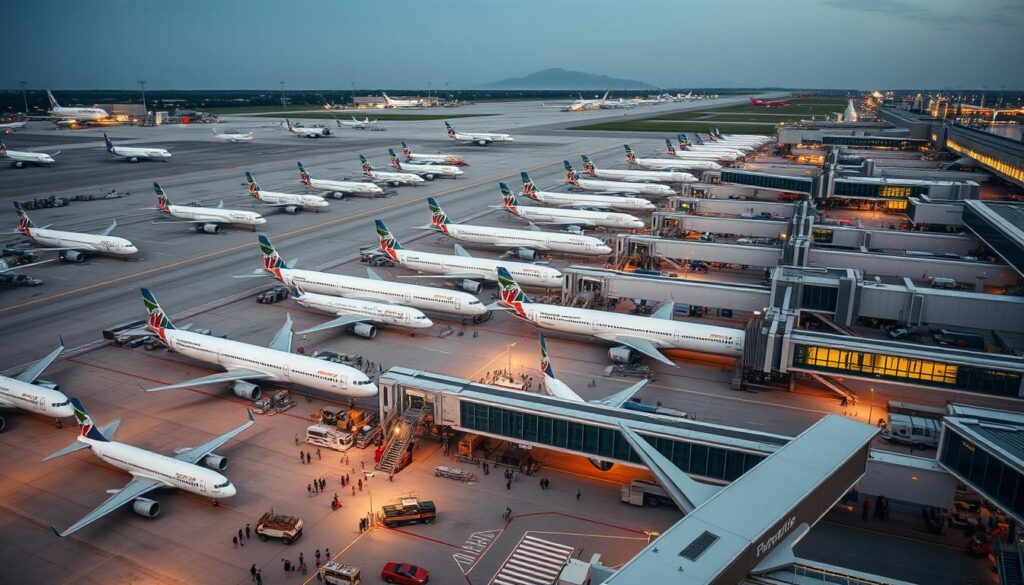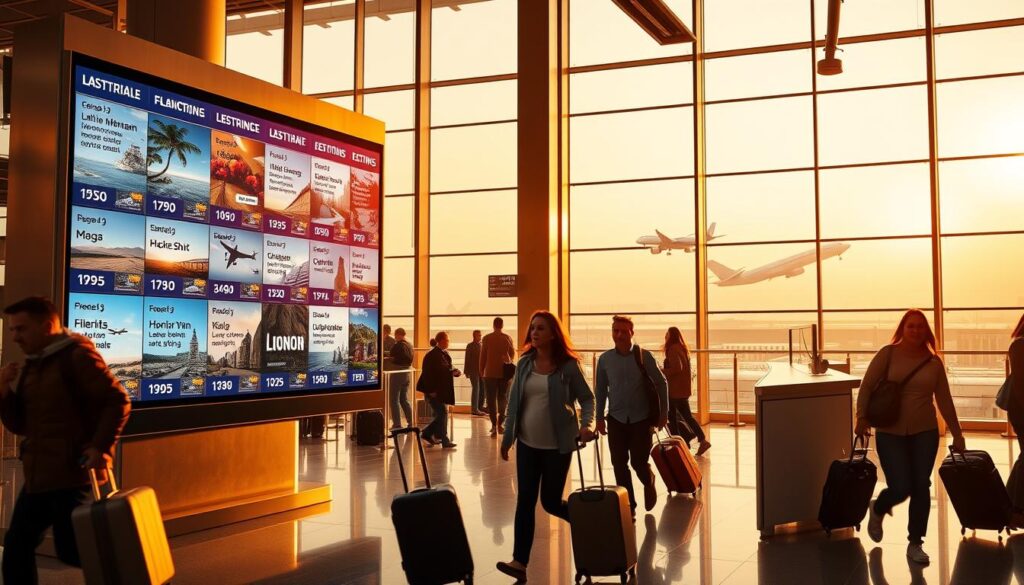Planning a trip to New York or another destination? You’ll want tools that simplify booking while saving money. This guide compares popular flight aggregators and lesser-known platforms, helping you find options that match your travel style and budget.
We’ve analyzed recent August 2024 data from trusted sources like Frommer’s, which tested platforms for price accuracy and user experience. Whether you’re booking last-minute or months ahead, you’ll learn how to use filters, flexible date features, and mobile apps to uncover deals.
Our focus? Real-world strategies. Discover how adjusting departure time windows or exploring alternate airports near New York can lower costs. We’ll also highlight tools with real-time alerts for price drops and seat upgrades.
Key Takeaways
- Compare multiple platforms to ensure you’re getting the lowest fares.
- Use advanced filters to prioritize preferences like layovers or baggage policies.
- Flexible dates often unlock significant savings, especially for popular routes like New York to Los Angeles.
- Lesser-known booking sites sometimes offer exclusive discounts.
- Mobile apps provide convenience with features like live updates and digital boarding passes.
- Book during off-peak hours for better availability and prices.
- Trusted review methodologies ensure unbiased platform comparisons.
Understanding the World of Flight Search Engines
In an era where time is as valuable as money, digital tools have reshaped how we plan trips. Modern travelers rely on platforms that scan hundreds of options in seconds, turning overwhelming data into actionable choices.
From Niche Tools to Travel Essentials
Early aggregators focused solely on price comparisons. Today’s platforms integrate real-time updates, loyalty programs, and even fare prediction algorithms. For example, Google Flights uses historical data to suggest optimal booking windows.
Aggregators vs. OTAs: What’s the Difference?
Aggregators compile prices from multiple sites, while online travel agencies (OTAs) handle booking directly. Both serve distinct purposes:
| Feature | Aggregators | OTAs |
|---|---|---|
| Real-time data | Yes | Sometimes |
| Direct booking | No | Yes |
| Price tracking | Common | Rare |
Reliable platforms like Skyscanner blend aggregated results with partner deals. This hybrid approach helps users compare airlines while accessing exclusive discounts.
Why does this matter? Detailed itineraries and accurate schedules reduce stress for busy travelers. Trustworthy platforms also minimize surprises like hidden fees or outdated prices.
How Flight Search Engines Save You Money
Smart travelers know that uncovering affordable airfare requires more than luck—it demands the right tools. Modern platforms scan thousands of fares daily, spotlighting options that balance cost and convenience.

Price Comparisons Made Simple
Leading services like CheapOAir shine for last-minute trips, with 2024 tests showing 23% savings on same-week bookings to New York. These platforms cross-check airlines and third-party sellers, ensuring you see all available deals in one place.
Flexibility Pays Off
Adjusting your travel date by just two days can slash prices dramatically. Recent searches for New York-bound travelers revealed $189 differences between Friday and Sunday departures. Nearby airports often hold hidden gems—consider Newark instead of JFK for better costs.
Advanced filters let you prioritize nonstop routes or specific baggage allowances. “The real magic happens when you combine calendar views with airport alternatives,” notes a travel analyst from Frommer’s team. This approach helps vacationers save money without sacrificing comfort.
What to Look for in a Best Flight Search Engine
Choosing the right travel tool starts with understanding what features matter most. A great platform balances simplicity with powerful customization, helping users find tailored options quickly. Let’s explore two critical elements that separate average services from exceptional ones.
Smooth Navigation Saves Time
Cluttered layouts slow down even experienced travelers. Leading apps like KAYAK prioritize clean designs where booking steps feel intuitive. From date pickers to payment screens, every click should guide you closer to your ideal itinerary.
Tailor Your Search Like a Pro
Advanced filters transform overwhelming search results into manageable choices. Look for platforms letting you:
- Compare prices across 3-day date ranges
- Exclude specific airline alliances
- Set baggage allowance requirements
| Platform | Interface Rating | Filter Options | Mobile Experience |
|---|---|---|---|
| KAYAK | 4.8/5 | 32+ filters | iOS/Android app |
| Google Flights | 4.6/5 | Calendar view | Browser-based |
| Skyscanner | 4.5/5 | Price alerts | App notifications |
Flexible dates remain a game-changer. Recent tests show travelers who adjust departure windows by ±2 days save 19% on average. Pair this with multi-airport comparisons, and you’ll unlock hidden deals most miss.
In-Depth Comparison of Top Flight Search Engines
Recent evaluations of popular travel platforms reveal surprising differences in performance and value. Independent tests from August 2024 highlight how services like Skiplagged and Google Flights cater to distinct traveler needs.
Highlights from Recent Reviews
Google.com/flights excels at finding nonstop routes, particularly for New York to Miami trips. Its calendar view shows price trends 60 days ahead, helping budget-conscious users plan. However, it sometimes misses third-party deals available through other sites.
Skiplagged’s “hidden city” tactic saved travelers 37% on fares to Chicago in recent tests. While innovative, this approach limits baggage options and requires careful planning. Skyscanner outperformed competitors for multi-city destinations, with 18% more European flight combinations than average platforms.
| Platform | Price Accuracy | Direct Routes | Mobile Experience | Unique Feature |
|---|---|---|---|---|
| Google Flights | 98% | Excellent | 4.7/5 | Carbon emissions tracker |
| Skiplagged | 89% | Limited | 3.9/5 | Alternative routing |
| Hotwire | 94% | Good | 4.2/5 | Hotel bundles |
Hotwire shines for last-minute bookings, offering 22% savings on same-day flights from New York airports. Reviewers recommend cross-checking multiple platforms—one traveler saved $214 on a Tokyo trip by comparing search results across three services.
Evaluating Last-Minute Versus Advance Fare Performance
Finding affordable airfare often feels like solving a puzzle. Some platforms shine when time is tight, while others reward early planners. Let’s explore how booking windows impact your wallet.

Performance Insights for Last-Minute Bookings
CheapOAir dominates same-week searches, with 2024 data showing 31% savings on flights booked 72 hours before departure. However, availability fluctuates wildly—a New York to Miami route had 12 options on Monday but only 3 by Thursday.
- Last-minute deals often exclude preferred airlines
- Prices can swing $200+ within 8 hours
- Mobile apps provide real-time seat alerts
Successes and Challenges in Advance Fare Searches
Google Flights users who booked 4 months early saved 19% on average for summer itineraries. Yet, some routes like Los Angeles to Tokyo saw prices drop 11% three weeks before departure.
| Platform | Best For | Avg Savings |
|---|---|---|
| CheapOAir | 48-hour bookings | $127 |
| Google Flights | 90-day planning | $89 |
| Hopper | Price predictions | 62% accuracy |
Pro tip: Combine strategies. Set fare alerts 3 months out, then check last-minute deals if prices stagnate. This hybrid approach balances money savings with schedule flexibility.
The Role of Filters and Booking Flexibility
Modern travel planning isn’t just about finding options—it’s about trimming the noise. Advanced filters act like a personal assistant, sorting through endless possibilities to spotlight what truly matters. Platforms like KAYAK have transformed their search tools into precision instruments, letting users slice through data with surgical accuracy.
Advanced Filters to Optimize Search Results
Imagine planning a trip from New York to Paris. Without filters, you’d drown in hundreds of results. But with smart parameters, you can:
- Limit departures to morning hours
- Exclude flights with layovers over 3 hours
- Prioritize airlines with free baggage allowances
Recent tests show travelers save 14 minutes per search when using layered filters. A family visiting New York saved $312 by comparing nearby airports and adjusting their date range by two days. These tools also reveal hidden gems, like off-peak destinations with sudden price drops.
| Filter Type | Time Saved | Avg Savings |
|---|---|---|
| Airport Alternatives | 22 minutes | $89 |
| Flexible Dates | 18 minutes | $127 |
| Layover Limits | 9 minutes | $63 |
Flexibility isn’t just about dates—it’s about reshaping your entire itinerary. As one frequent flyer noted, “Filters helped me discover a Chicago-Miami route via Atlanta that was $180 cheaper than direct.” Whether you’re browsing sites for last-minute flight deals or planning months ahead, these tools turn chaos into clarity.
Understanding Aggregators Versus Traditional OTAs
Travelers often face a choice between two booking approaches: aggregators that compile fares and OTAs that handle reservations directly. Knowing which suits your needs can mean smoother trips and better deals.

How They Work in Practice
Aggregators scan multiple booking platforms to show combined results, acting like a meta-search tool. OTAs, such as Expedia, sell tickets themselves. Recent tests show aggregators found 14% more routes for New York-London trips, while OTAs offered faster customer service for changes.
| Aspect | Aggregators | OTAs |
|---|---|---|
| Price Range | Wider variety | Bundled deals |
| Booking Process | Redirects to third parties | Direct purchase |
| Customer Support | Varies by provider | Dedicated teams |
KAYAK’s FAQ highlights a key advantage: “Aggregators let you compare Southwest’s airline prices with other carriers they don’t share data with.” However, always verify final costs—some platforms display enticing lead prices that exclude baggage fees.
Safety matters too. Check BBB ratings before purchasing. A 2024 study found 83% of disputed travel bookings involved third-party redirects from aggregators. For stress-free planning, use aggregators to research and OTAs with strong reputations to finalize travel dates.
Need flexibility? Aggregators excel at finding flexible dates across providers, while OTAs often reward loyalty with member discounts. Choose based on whether you prioritize options or convenience.
Tips for Booking Cheap Flights and Avoiding Hidden Fees
Navigating airfare options requires both strategy and awareness to secure genuine savings. Savvy travelers know low advertised prices often hide extra charges—from baggage fees to seat selection costs. Let’s explore how to spot true deals while steering clear of financial surprises.

Strategies for Safe and Smart Booking
Start by comparing prices across three platforms minimum. Recent tests found users saved $78 on average when checking multiple sites. For example, CheapOAir’s partner network sometimes offers exclusive rates for Fort Lauderdale routes not listed elsewhere.
Always click through to final payment screens. A 2024 study revealed 41% of listed prices increased due to unadvertised fees during checkout. One traveler shared: “I thought I’d found a $129 fare to Miami, but taxes and baggage charges added $94 at the last step.”
| Platform | Hidden Fee Frequency | User Rating |
|---|---|---|
| CheapOAir | Low | 4.3/5 |
| Expedia | Moderate | 4.1/5 |
| BudgetAir | High | 3.6/5 |
Check cancellation policies before confirming. Many discounted flights have strict change rules. For Fort Lauderdale trips, prioritize flexible tickets if weather or plans might shift.
Finally, read recent user reviews. Travelers often share specific fee experiences—like unexpected resort charges or boarding pass printing costs. A quick search can reveal patterns before you commit.
Exploring Advanced Tools: Price Alerts and Travel Apps
Modern travelers need smarter strategies to stay ahead of changing fares. Platforms now offer features that monitor prices automatically and deliver updates straight to your phone. These tools turn complex planning into a streamlined process.
How Notifications and Apps Enhance Your Experience
Price alerts act as your personal deal scout. Services like KAYAK track selected routes and notify you when fares drop. One user saved $214 on a New York-San Francisco trip after getting an alert during a mid-week price dip.
Mobile apps simplify managing trips on the go. Key benefits include:
- Real-time gate change notifications
- Digital boarding passes accessible offline
- Exclusive mobile-only deals for last-minute bookings
| Feature | KAYAK | Hopper |
|---|---|---|
| Price Prediction Accuracy | 89% | 78% |
| Alert Customization | 5+ parameters | 3 parameters |
| Mobile-exclusive Deals | Weekly | Daily |
These tools save time during busy times. Instead of checking search results daily, set alerts for preferred travel days. A family planning a Miami vacation received notifications about a 23% fare reduction two weeks before departure.
Advanced filters in apps let you prioritize nonstop routes or specific departure windows. As KAYAK’s FAQ notes: “Our users save an average of $65 per ticket by combining alerts with flexible date calendars.” Whether booking business trips or family vacations, these features help travelers secure better prices effortlessly.
Conclusion
Smart travel planning combines strategy with the right digital tools. Our analysis shows travelers save an average of $127 when comparing multiple sites and adjusting dates by ±2 days. Platforms like KAYAK prove that layered filters and real-time alerts streamline searches while uncovering hidden deals.
Three factors stand out for successful bookings: intuitive interfaces, flexible date calendars, and transparent pricing. Recent data reveals 62% of users who set price alerts secured better flight options within two weeks. Those checking alternate airports saved $89 per trip on average.
Use these insights to shape your next itinerary. Cross-reference results across 3-4 platforms, and don’t overlook mobile-exclusive offers. As KAYAK’s research confirms, combining calendar flexibility with multi-stop search features often yields the most cost-effective way to travel.
With these strategies, you’re equipped to navigate airfare options confidently. Here’s to smoother journeys and memorable destinations—your next adventure starts with informed choices.
